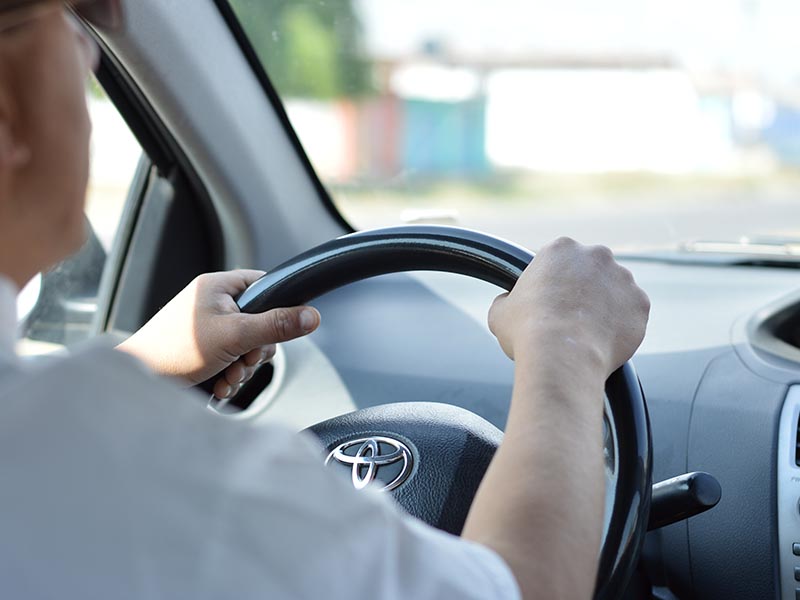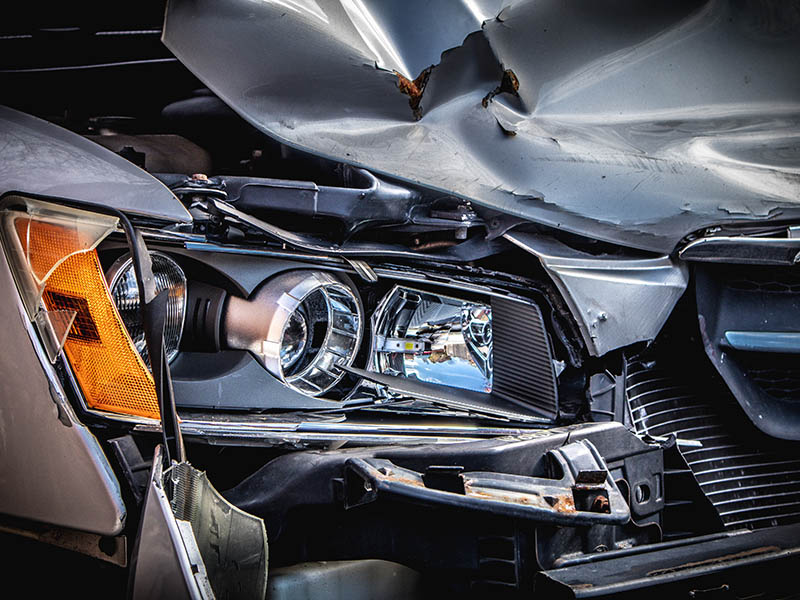Is Driving While Sick Considered Negligence?
When cold and flu season hits, that could mean more drivers on California roads who may be using decongestants or cold medicines that slow their reaction times. High fevers and chills can also cause discomfort and reduce concentration while driving.
Many people don’t realize that operating a vehicle with a cold can be just as risky as driving under the influence. Driving in this condition can mean not meeting the usual standard of care, and you might be held responsible for accidents caused in such a medicated or affected state.
 The responsible choice is to avoid driving with a fever. Resting at home not only helps you recover faster but also ensures you’re not endangering others due to impaired driving ability. If driving is absolutely necessary, consider whether someone else can take the wheel.
People who are sick or running a high fever should take time to rest and avoid putting others in danger on the road. Driving with a fever can impair your judgment, slow your reaction time, and increase the risk of an accident.
Driving with a fever increases the likelihood of making critical errors behind the wheel. Even a mild fever can reduce focus and coordination. In more severe cases, it can lead to confusion or fainting, putting you at serious risk of causing a crash. If you’re feeling unwell, especially with a high fever, it’s best to delay travel until you’ve recovered or find alternative transportation.
If you’re experiencing a high temperature, it’s best to rest and avoid getting behind the wheel to protect yourself and others on the road.
The responsible choice is to avoid driving with a fever. Resting at home not only helps you recover faster but also ensures you’re not endangering others due to impaired driving ability. If driving is absolutely necessary, consider whether someone else can take the wheel.
People who are sick or running a high fever should take time to rest and avoid putting others in danger on the road. Driving with a fever can impair your judgment, slow your reaction time, and increase the risk of an accident.
Driving with a fever increases the likelihood of making critical errors behind the wheel. Even a mild fever can reduce focus and coordination. In more severe cases, it can lead to confusion or fainting, putting you at serious risk of causing a crash. If you’re feeling unwell, especially with a high fever, it’s best to delay travel until you’ve recovered or find alternative transportation.
If you’re experiencing a high temperature, it’s best to rest and avoid getting behind the wheel to protect yourself and others on the road.
 Did you know that taking some cold medicines along with having a high fever can sometimes cause a breathalyzer to register you as if you had been drinking alcohol?
Certain cold remedies contain ingredients similar to alcohol that slow down your reflexes and make you sleepy. You’ve probably seen the warnings on the bottle to not operate heavy machinery or how the medications can cause drowsiness.
This can affect your driving, leading to behaviors like weaving between lanes, unnecessarily reducing speed, and reacting more slowly to road conditions. When your body temperature rises due to a fever, the effects of these medicines can become stronger, making you feel the impact more than usual.
Did you know that taking some cold medicines along with having a high fever can sometimes cause a breathalyzer to register you as if you had been drinking alcohol?
Certain cold remedies contain ingredients similar to alcohol that slow down your reflexes and make you sleepy. You’ve probably seen the warnings on the bottle to not operate heavy machinery or how the medications can cause drowsiness.
This can affect your driving, leading to behaviors like weaving between lanes, unnecessarily reducing speed, and reacting more slowly to road conditions. When your body temperature rises due to a fever, the effects of these medicines can become stronger, making you feel the impact more than usual.
 If you were hurt in a crash caused by a driver who was sick behind the wheel or under the influence of medication, you may have grounds to hold that driver responsible. If they knew about their illness and still decided to drive, they neglected their basic responsibility to others on the road.
Call us at 909-308-1118 or contact us online to book a free, no-obligation consultation with one of our experienced motor vehicle accident attorneys near you in San Bernardino.
If you were hurt in a crash caused by a driver who was sick behind the wheel or under the influence of medication, you may have grounds to hold that driver responsible. If they knew about their illness and still decided to drive, they neglected their basic responsibility to others on the road.
Call us at 909-308-1118 or contact us online to book a free, no-obligation consultation with one of our experienced motor vehicle accident attorneys near you in San Bernardino.
On This Page
ToggleCan I Drive with a Fever?
 The responsible choice is to avoid driving with a fever. Resting at home not only helps you recover faster but also ensures you’re not endangering others due to impaired driving ability. If driving is absolutely necessary, consider whether someone else can take the wheel.
People who are sick or running a high fever should take time to rest and avoid putting others in danger on the road. Driving with a fever can impair your judgment, slow your reaction time, and increase the risk of an accident.
Driving with a fever increases the likelihood of making critical errors behind the wheel. Even a mild fever can reduce focus and coordination. In more severe cases, it can lead to confusion or fainting, putting you at serious risk of causing a crash. If you’re feeling unwell, especially with a high fever, it’s best to delay travel until you’ve recovered or find alternative transportation.
If you’re experiencing a high temperature, it’s best to rest and avoid getting behind the wheel to protect yourself and others on the road.
The responsible choice is to avoid driving with a fever. Resting at home not only helps you recover faster but also ensures you’re not endangering others due to impaired driving ability. If driving is absolutely necessary, consider whether someone else can take the wheel.
People who are sick or running a high fever should take time to rest and avoid putting others in danger on the road. Driving with a fever can impair your judgment, slow your reaction time, and increase the risk of an accident.
Driving with a fever increases the likelihood of making critical errors behind the wheel. Even a mild fever can reduce focus and coordination. In more severe cases, it can lead to confusion or fainting, putting you at serious risk of causing a crash. If you’re feeling unwell, especially with a high fever, it’s best to delay travel until you’ve recovered or find alternative transportation.
If you’re experiencing a high temperature, it’s best to rest and avoid getting behind the wheel to protect yourself and others on the road.
Operating a Vehicle When You Don’t Feel Good
Feeling unwell often comes with symptoms like coughing, a blocked or runny nose, fever, chills, and body aches, which can distract anyone behind the wheel. A recent study from a British insurance company named Young Marmalade looked into how having a common cold affects driving ability. Their research showed that when people are sick, their driving skills drop by about half. Those with a cold had slower reaction times and struggled to concentrate, making driving riskier. The study even compared driving with a cold to driving after drinking four double whiskeys, finding both to be equally unsafe. So, yes, according to this study, driving with a fever or while ill can compromise reaction times, reduce concentration, and generally make you as dangerous on the road as someone who slogged down a few shots of whiskey. Since many Americans still choose to drive while battling cold or flu symptoms, it’s estimated that roughly one million people are on the roads each day in that condition. Whether or not driving in this condition is ruled to be negligent is up to insurance companies, attorneys, and, if needed, judges and juries to decide.Sickness and Distraction While Driving: A Growing Safety and Liability Concern
When you’re feeling unwell behind the wheel, your attention isn’t fully on driving. Research in Britain found that each week, about 2,500 more accidents happened due to actions like sneezing, grabbing a tissue, or blowing your nose. Many people think distracted driving only involves texting or phone calls, but dealing with cold symptoms can be just as risky. Sneezing causes you to close your eyes briefly, and during that moment, your vehicle can travel over 50 feet without your focus on the road. Reaching for tissues takes your eyes off the road and a hand off the wheel, increasing the chance your car might drift into another lane. Here in California, if you experience an accident because of distractions caused by illness, we at Gold Law Firm are always ready to assist with personal injury cases or car accident claims.Cold Meds, Sickness, and Driving
 Did you know that taking some cold medicines along with having a high fever can sometimes cause a breathalyzer to register you as if you had been drinking alcohol?
Certain cold remedies contain ingredients similar to alcohol that slow down your reflexes and make you sleepy. You’ve probably seen the warnings on the bottle to not operate heavy machinery or how the medications can cause drowsiness.
This can affect your driving, leading to behaviors like weaving between lanes, unnecessarily reducing speed, and reacting more slowly to road conditions. When your body temperature rises due to a fever, the effects of these medicines can become stronger, making you feel the impact more than usual.
Did you know that taking some cold medicines along with having a high fever can sometimes cause a breathalyzer to register you as if you had been drinking alcohol?
Certain cold remedies contain ingredients similar to alcohol that slow down your reflexes and make you sleepy. You’ve probably seen the warnings on the bottle to not operate heavy machinery or how the medications can cause drowsiness.
This can affect your driving, leading to behaviors like weaving between lanes, unnecessarily reducing speed, and reacting more slowly to road conditions. When your body temperature rises due to a fever, the effects of these medicines can become stronger, making you feel the impact more than usual.
How Slower Reaction Times from Illness Can Lead to Negligent Driving
Along with whiskey, research also showed that having a cold can slow a person’s reaction time more than drinking four pints of beer. A cold can delay responses by up to 36 milliseconds, while alcohol causes a smaller delay of about 15 milliseconds. Even a simple sneeze or cough can pull a driver’s focus away from the road. When someone is sick with a cold or the flu, the body’s fight against infection changes brain chemistry, which affects mood, memory, and movement. These changes can make it harder to react quickly, increasing the risk of serious accidents behind the wheel. If you were in an accident where you suspect the other driver might have been sick or under the influence of medication, we encourage you to talk with one of our car accident lawyers near you to get a complete understanding of your rights.When You Are Too Sick to Drive: Understanding the Risks and Legal Consequences
When you need to get to work, take the kids to school, or pick up medication and see a doctor, it’s important to consider your ability to drive safely. If you’re feeling too ill to drive, ask a friend or family member for a ride to your appointment. Although it might feel inconvenient, arranging a ride helps keep everyone on the road safer. Choosing to drive while sick could make you responsible for any accidents or injuries that happen because of it. Different illnesses can affect your body and how well you can react behind the wheel:- The flu can slow your reflexes and cause fever, nausea, headaches, and blurry vision.
- Eye infections lead to redness, itchiness, and blurred sight.
- Ear infections might bring dizziness, pain, and drowsiness from medication.
- Migraines come with intense pain and vision problems, while treatments can cause sleepiness and slow reactions.
- The stomach flu causes vomiting, fever, and weakness, all of which make driving dangerous.
If Another Driver’s Illness Led to Reckless Driving, You May Have a Negligence Case
 If you were hurt in a crash caused by a driver who was sick behind the wheel or under the influence of medication, you may have grounds to hold that driver responsible. If they knew about their illness and still decided to drive, they neglected their basic responsibility to others on the road.
Call us at 909-308-1118 or contact us online to book a free, no-obligation consultation with one of our experienced motor vehicle accident attorneys near you in San Bernardino.
If you were hurt in a crash caused by a driver who was sick behind the wheel or under the influence of medication, you may have grounds to hold that driver responsible. If they knew about their illness and still decided to drive, they neglected their basic responsibility to others on the road.
Call us at 909-308-1118 or contact us online to book a free, no-obligation consultation with one of our experienced motor vehicle accident attorneys near you in San Bernardino. 